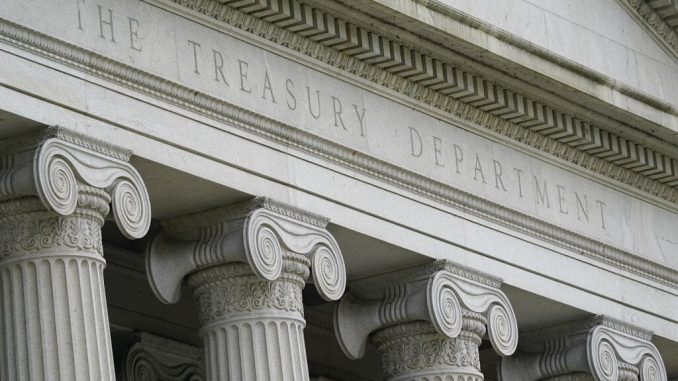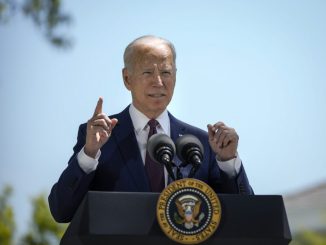

FILE – This May 4, 2021, photo shows the Treasury Building in Washington. The U.S. budget deficit hit a record $2.06 trillion through the first eight months of this budget year as coronavirus relief programs drove spending to all-time highs. (AP Photo/Patrick Semansky, file)
OAN Newsroom
UPDATED 6:54 AM PT – Thursday, June 17, 2021
A group of analysts fear Joe Biden’s $6 trillion proposed budget will have massive consequences on the nation’s long term economic success. In fact, researchers at the Tax Foundation, a nonprofit seeking to inform smarter tax policy at all levels of government, reported Wednesday that Biden’s proposed budget will actually cut economic growth.
The foundation concluded the budget will cut long-term economic growth by 1 percent in the next decade and will eliminate 165,000 full time jobs. While the non-partisan report claims long term GDP will increase by 0.3 percent, presumably due to enhanced public infrastructure, the “positive economic effect is entirely offset by the increase in corporate and individual taxation.”
The increase in taxes are expected to result in less work and investment, which combined with increased spending under the Biden administration’s budget will reduce GDP by nearly 1 percent and also leads to lower wages.
Taxes are once again at the forefront of the public policy debate here in Washington, D.C.
Our tax tracker can help you stay up-to-date as new plans emerge from the Biden administration and Congress.#AmericanJobsPlan #AmericanFamiliesPlanhttps://t.co/oh0oJthflw
— Tax Foundation (@TaxFoundation) June 16, 2021
The report highlights increasing the corporate tax from 21 percent to 28 percent will have a severe consequence on the nation’s gross domestic product. While increasing taxes imposes risks on the nation’s economy, many fear lavish spending programs will also cause harm.
In a PBS interview, economist and former Treasury Secretary Lawrence Summers highlighted an alarming reality. Heavy government spending can create inflation and cause collateral damage on the economy.
“A recession’s not the main risk; the main risk is that our economy’s going to overheat and then once it overheats, it’s going to be hard to put out the fire without doing a lot of damage and causing a lot of problems,” Summers explained. “And so, I’d like to see us shift towards a policy concern.”
In the meantime, Federal Reserve officials project that interest rates will hike earlier than expected in 2023, which will be a result of inflation caused by government spending.





Be the first to comment